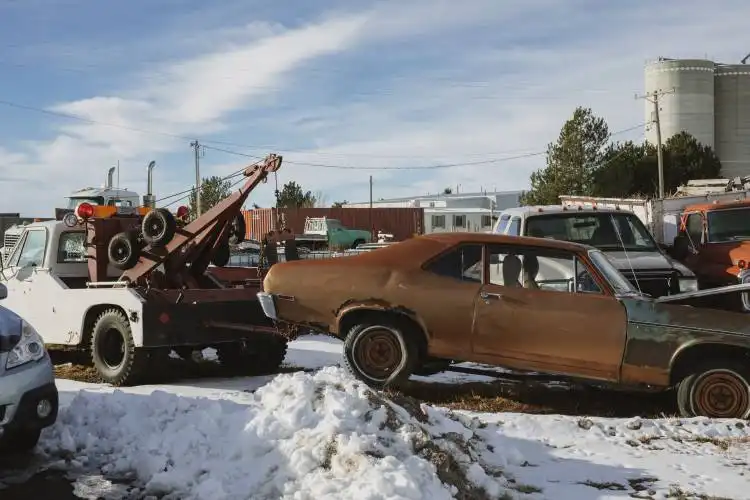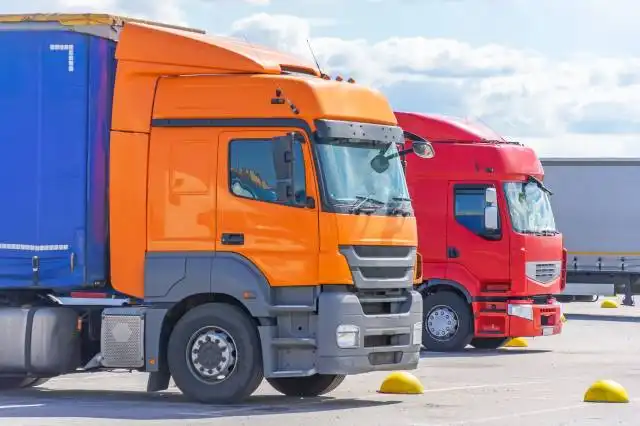Start a Tractor Trailer Business
Venturing onto the Highway of Success: Your Tractor Trailer Business
| Updated


TRACTOR TRAILER BUSINESS
Well, buckle up new entrepreneurs, because the tractor trailer business is a highway to success! This venture is all about trading in 18 wheels, diesel, and countless miles of open road. Here's the jest, you take the front seat in moving goods and commodities from point A to B. It's like being Santa Claus all year round, except you trade in the reindeer for horsepower!
Jump to Business Plan
RELATED BUSINESS IDEAS
Browse ALL Cars & Transportation Solutions Business Ideas
Discover Your Perfect Domain
Unlock the door to your online success with our hand-picked selection of premium domain names. Whether you're starting a new venture or rebranding an existing one, the right domain can set the tone for your digital presence. Browse through our curated list, each with its unique potential to enhance your brand's visibility and credibility.
TRACTOR TRAILER MINI BUSINESS PLAN
This a quick reality check to help you identify the strengths and weaknesses of your business concept before you dive in.
Business Idea: Tractor Trailer Business
Expected Percent Margin:
- Gross Margin: 30-40%
- Net Profit Margin: 15-25%
Earnings Expectations:
- Daily Earnings: $500 - $700 (depends on trips)
- Weekly Earnings: $3,500 - $4,900
- Monthly Earnings: $15,000 - $21,000
- Annual Earnings: $180,000 - $252,000
Actions to hit Those Numbers:
Equipment Purchase and Management:
- Initial Investment: One tractor and trailer typically costs between $100,000 - $200,000.
- Maintenance: Regular servicing every 15,000 miles to ensure that the vehicle are safe and reliable.
Building a Customer Base:
- Networking: Build robust client relationships for ongoing contracts.
- Marketing: Regular online and offline advertising to gather more customers.
Personnel Management:
- Driver Recruitment: Hiring experienced, reliable drivers with strong track records.
- Training: Regular training and updates for drivers on safety, efficiency and regulations.
Cost Control:
- Fuel Efficiency: Efficient route planning and regular vehicle maintenance to save on fuel costs.
- Insurance: Choose the right level of insurance to avoid hefty bills from unknown occurrences.
Regulatory Compliance:
- Licenses & Permits: Ensure all necessary licenses, permits and insurances are in place.
- Compliance: Regular checks to ensure compliance with safety regulations and truck business requirements.
Please note that these figures are approximations and your actual results might differ. Always talk to a financial advisor before embarking on a new business venture.
NOT WHAT YOU HAD IN MIND? Here are more ideas



Browse ALL Cars & Transportation Solutions Business Ideas
Grab Your Business Website Name
Before you get caught up in the whirlwind of setting up your business, invest in a domain name. It's a small but significant step that lays the foundation for your brand and makes it easier for customers to find and trust you. Just like you wouldn't build a house without securing the land first, don't build a business without securing your domain name.
"Why? Can't that wait?" Here's why it shouldn't
Step 1: Determine if the Business is Right for You
Breakdown of Startup Expenses
Starting a tractor trailer business requires a significant investment. Before committing to the venture, it is important to understand the startup costs. These costs may include the purchase of a tractor and trailer, insurance, registration fees, and licensing fees. Additionally, you may need to invest in additional equipment such as a GPS system, communication equipment, and safety equipment. It is also important to consider the cost of fuel, maintenance, and repairs, as well as any other costs associated with running the business.
Breakdown of Ongoing Expenses
In addition to the startup costs, there are also ongoing expenses associated with running a tractor trailer business. These expenses may include fuel, insurance, maintenance, and repairs. Additionally, you may need to pay for additional services such as storage, loading and unloading, and transportation. It is also important to consider the cost of hiring employees, as well as any other costs associated with running the business.
Examples of Ways to Make Money
There are several ways to make money with a tractor trailer business. One of the most common ways is to haul freight for companies. This could include hauling goods from one location to another, or even delivering goods to customers. Additionally, you could offer services such as vehicle transport, storage, or even provide transportation for special events. Additionally, you could offer specialized services such as hazardous material transport or refrigerated transport. Finally, you could also offer services such as roadside assistance or emergency transport.
Step 2: Name the Business
When naming a business, it is important to choose a name that is memorable, unique, and easy to pronounce. It should also be something that reflects the business’s mission and values. Additionally, it is important to make sure the name is not already taken by another business. To do this, it is important to research the name with the United States Patent and Trademark Office (USPTO) and to check with the local Secretary of State’s office to make sure the name is available.
Once the desired name is available, it is important to register the business with the state and obtain a business license. Additionally, it is important to register the business name with the USPTO to protect it from being used by another business. This can be done by filing a trademark application. It is also important to check with the Internal Revenue Service (IRS) to make sure the business name is available for use on tax forms.
When registering the business name, it is important to consider the domain name as well. It is important to make sure the domain name is available and to register it. This will help to ensure that the business’s website is easy to find and that the business is easily recognizable. Additionally, it is important to consider the social media presence of the business. It is important to make sure the business name is available on all major social media platforms.
Finally, it is important to make sure the business name is legally compliant. This includes making sure the name does not infringe on any trademarks or copyrights. Additionally, it is important to make sure the name is not offensive or inappropriate. Once the business name is chosen, it is important to make sure it is used consistently across all business materials, including business cards, websites, and social media accounts.
Step 3: Obtain Licenses and Permits
In order to operate a tractor trailer business, there are certain licenses and permits that must be obtained. Depending on the state, these may include a commercial driver's license, a hazardous materials endorsement, a medical certificate, and a business license. Additionally, the business may need to obtain a federal motor carrier number, a unified carrier registration, and an international fuel tax agreement. It is important to research the specific requirements in the state in which the business will be operating.
Insurance
In addition to the necessary licenses and permits, the business must also obtain insurance. This includes liability insurance, cargo insurance, and physical damage insurance. Liability insurance covers any damage that the business may cause to another person or property. Cargo insurance covers any damage to the cargo that is being transported. Physical damage insurance covers any damage to the tractor trailer itself. It is important to research the different types of insurance and make sure that the business has the coverage it needs.
Research Regulations
The business must also research the regulations that apply to the transportation of goods. This includes the regulations of the Department of Transportation, the Federal Motor Carrier Safety Administration, and the Environmental Protection Agency. These regulations cover topics such as hours of service, vehicle maintenance, and hazardous materials. It is important to make sure that the business is in compliance with all applicable regulations.
Step 4: Purchase Equipment
The types of equipment needed to start a tractor trailer business include a tractor, trailer, and other necessary items such as a GPS system, CB radio, and a fuel card. Depending on the type of business, additional items such as a refrigeration unit, flatbed, and other specialized equipment may also be necessary. It is important to research the types of equipment needed for the type of business desired.
Buying Used vs. New
When it comes to purchasing equipment, it is important to consider the pros and cons of buying used versus new. Buying used can be more cost-effective, but it is important to make sure the equipment is in good condition and up to date with safety regulations. New equipment is more reliable, but it can be more expensive. It is important to weigh the pros and cons of each option to determine which is best for the business.
Financing Options
When it comes to financing the equipment, there are several options available. Business owners can apply for a business loan, use their own funds, or look into leasing or renting options. It is important to research the different financing options available and determine which is best for the business.
Insurance
Insurance is an important part of owning a tractor trailer business. It is important to research the different types of insurance available and purchase the necessary coverage. This includes liability insurance, cargo insurance, and physical damage insurance. It is important to make sure the business is properly covered in the event of an accident or other unexpected event.
Step 5: Find a Location
Finding the right location for a tractor trailer business is essential for success. The location should be easily accessible to customers, have adequate parking, and be in a safe area. Additionally, the location should have a good reputation and be in a location that is conducive to the type of business being conducted.
Zoning Laws
Before selecting a location, it is important to research local zoning laws to ensure that the business is in compliance. Zoning laws can vary from city to city, so it is important to understand the local regulations before selecting a location. Additionally, it is important to check with the local government to ensure that the business is properly zoned for the type of business being conducted.
Leasing or Purchasing
Once a suitable location has been identified, the next step is to decide whether to lease or purchase the property. Leasing a property can be a good option for businesses that are just starting out, as it can provide flexibility and lower upfront costs. However, purchasing a property can be a good option for businesses that are more established and have the capital to invest in a long-term property.
Insurance
It is also important to obtain the necessary insurance for the business. This includes liability insurance, property insurance, and vehicle insurance. Liability insurance will protect the business from any potential lawsuits, while property insurance will protect the business from any damage to the property. Vehicle insurance is necessary to protect the business from any damage to the vehicles used in the business.
Step 6: Obtain Insurance
Insurance is a necessary part of any business, and a tractor trailer business is no exception. The types of insurance needed include: liability insurance, cargo insurance, and physical damage insurance. Liability insurance will protect the business from any legal claims that may arise from accidents or other incidents. Cargo insurance will cover any losses due to theft or damage to the cargo being transported. Physical damage insurance will cover any damage to the tractor trailer itself.
Cost of Insurance
The cost of insurance will depend on the type of coverage needed, the size of the business, and the type of cargo being transported. Liability insurance is typically the most expensive, followed by cargo insurance and physical damage insurance. It is important to shop around and get quotes from different insurance companies to ensure that the business is getting the best coverage at the best price.
Finding an Insurance Provider
Finding an insurance provider can be done online or through a local insurance agent. It is important to research the different providers to make sure they are reputable and have the coverage needed. It is also important to read the fine print and make sure the policy covers all the necessary items.
Finalizing the Insurance
Once a provider has been chosen, the business will need to provide the necessary information to the insurance company. This includes the type of business, the size of the business, the type of cargo being transported, and any other relevant information. Once the information has been provided, the insurance company will provide a quote and the business can decide if they want to accept the coverage.
Step 7: Establish a Network
Establishing a network of contacts is an important step in starting a tractor trailer business. A network of contacts can provide valuable resources and advice, and can even lead to potential customers. Having a network of contacts can also help to build trust and credibility in the business. Additionally, having a network of contacts can help to spread the word about the business and its services.
How to Establish a Network
One of the best ways to establish a network is through attending industry events and conferences. These events are great for meeting other professionals in the industry and building relationships. Additionally, joining professional organizations and associations related to the tractor trailer business can be a great way to meet other professionals and build a network. Social media can also be a great way to connect with other professionals in the industry. Finally, networking with local businesses can be a great way to build relationships and find potential customers.
Step 8: Market the Business
Once the business is up and running, it is important to market it to potential customers. There are many different strategies for marketing a business, such as advertising in local newspapers and magazines, creating a website, and using social media. It is also important to create a logo and slogan for the business, as this will help to create a recognizable brand. Additionally, it is important to network with other businesses in the industry to create connections and increase visibility.
Develop a Pricing Strategy
When marketing the business, it is important to develop a pricing strategy. This should include researching the competition to determine what they are charging and then setting a price that is competitive. Additionally, it is important to consider the cost of the services being provided and the profit margin desired. It is also important to consider any discounts or special offers that can be provided to customers.
Create a Customer Service Plan
In addition to pricing, it is important to create a customer service plan. This should include setting up a system for responding to customer inquiries and complaints, as well as providing quality customer service. Additionally, it is important to create a system for tracking customer feedback and making improvements based on customer feedback.
Utilize Online Resources
Finally, it is important to utilize online resources to market the business. This includes creating a website, utilizing search engine optimization (SEO) techniques, and utilizing social media platforms to reach potential customers. Additionally, it is important to create content that is relevant to the business and engaging for potential customers. This can include blog posts, videos, and other forms of content.
Step 9: Maintain Records
Maintaining accurate records is essential for any business, and a tractor trailer business is no exception. It is important to keep track of all expenses, income, and other financial information. This includes fuel receipts, maintenance records, and any other records related to the business. Additionally, it is important to keep track of any licenses and permits that are required for the business. This will ensure that the business is in compliance with all applicable laws and regulations.
Benefits of Maintaining Records
Maintaining accurate records can provide a number of benefits to a tractor trailer business. It can help to ensure that the business is running efficiently and that all expenses are accounted for. Additionally, it can help to provide an accurate picture of the business’s financial health. This can help to ensure that the business is profitable and that it is able to meet its financial obligations. Finally, it can help to provide a clear picture of the business’s progress over time. This can help to identify areas that need improvement and can help to ensure that the business is on the right track.
EXPLORE MORE CATEGORIES
Browse ALL Business Idea Categories
TAKE THE NEXT STEPS









